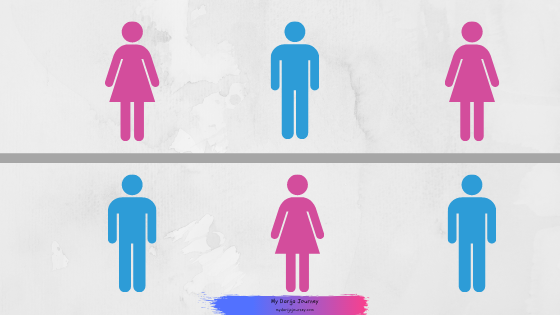Imagine, being in a relationship with more than one person at the same time. I’m not talking about cheating on someone. I’m talking about a relationship where having another partner is known and understood. Where you are able to acquire another partner and that you will be treated exactly like the previous partner. This is what they call polyamorous relationships.
Polyamory or polyamorous relationships are the practice or desire for relationships with more than one partner. All people in polyamorous relationships have an understanding and accept this arrangement. This type of relationship is different than just having a “one night stand” with someone outside of your relationship. The intention is the new partner will be a part of your relationship and your other partner will know and accept this arrangement. All people in this relationship will show the same love, affection, and intimacy towards each other. While this may seem strange in most parts of the world, is it common in Morocco?
Polyamorous relationships are not common in Morocco, however, they are legal. Most people, especially the women in Morocco, will not accept concepts such as open marriages or open relationships. These ideas are completely foreign to Moroccans which they do not understand, however they do understand the concept of a polyamorous relationship. In Morocco, the definition of polyamorous relationships is a bit more specific than the general definition of the term.
Definition in Morocco

In Morocco, polyamorous relationships are defined as a husband with more than one wife. While there does exist relationships outside of marriage, this is not accepted in Moroccan society and precautions have to be taken to keep these relationships secret. As well, relationships outside of marriage while they do occur in Morocco, the majority of relationships outside of marriage are between a Moroccan and a foreigner. Let’s see how polyamorous relationships work in Morocco.
How it works in Morocco
Morocco is a Muslim country and as such follows Islamic laws. One of the Islamic laws states that a man is allowed to marry up to 4 wives. In 2004, there were amendments to this law. These new laws allow the wives to not be taken advantaged of. As of now, there are a few conditions to marrying more than one wife.
- The wife or wives must give consent for the husband to marry the new wife
- Each wife will be taken care of equally
In order to get married in Morocco, you would follow the regular Moroccan marriage process. In addition to this, you will have to be living in Morocco and not be living in countries like America, Canada, or England as these countries do not accept these types of marriages. You will have to get your first wife’s consent and prove that you will be able to take care of the wives equally. On top of these rules, the judge must accept this type of marriage based on you are your future wives’ situation. Like I mentioned previously, polyamorous relationships are not very common, probably due to the rules above. The interesting thing is that they still exist. Why is it that some people accept this type of relationship?
Why is it still accepted?
I have spoken to both men and women in Morocco and both of them have told me that they know someone, whether it be a relative or friend who has married more than one wife. While in Morocco polyamorous relationships are not very common they still exist. Most women especially working women, will not accept her husband marrying another woman. Surprisingly, none of the women I speak to are shocked or disgusted by this. It’s simply not a preference for them. So then why is it still accepted in Morocco? Here are some of the reasons I have identified.
Part of religious law
Because Morocco is a Muslim country and follows Islamic law, the people in Morocco accept this lifestyle as it is defined as acceptable within Islamic law
Security
A lot of people in Morocco are not wealthy. A woman entering a polyamorous relationship will at least be protected by law, as the husband must meet certain financial requirements before he can marry another wife. This gives security to the wife knowing she will be provided for.
Freedom
While this may sound strange, some women feel free when marrying a husband with other wives. How it was explained to me was that they want to be married but they like their alone time as well. While the husband has more than one wife, he will have to divide his time between his wives, some women are happy to have that alone time to pass with their kids and just have the home to themselves.
Age
Women in Morocco seem to want to get married before they reach the age of 30. The idea they have is once they reach 30, finding a husband to marry will be very difficult. The idea is that men prefer younger women to marry. This idea has made polyamorous relationships acceptable to some women, knowing that at least they will be married.
Respect
Whether women are in monogamous or polyamorous relationships both types of relationships are treated equally in Morocco. Married women are treated with respect. There are no stigmas if you are married to a man with multiple wives.
Does it work with Women

Although a man can marry up to 4 women in Morocco, a woman can only marry one man. There are women who will scam multiple guys (see my article on romance scams) but she doesn’t have any intention of marrying any of them or considering herself in a relationship with them. There was a popular scam where the Moroccan woman would befriend a foreign man. She would then convince him to marry her and bring her to his country. Once the foreign man married the woman and brought her to his country she would quickly disappear from him and appear about a year later, she would ask for a divorce. When the divorce is final, she would marry her Moroccan boyfriend who she had been involved with since the beginning and bring him to the new country. I”m sure most countries are aware of this scam and have restructured their immigration laws to handle this scam. The point of this story was to explain how this may be considered a polyamorous relationship, with a woman with multiple partners. But is this really a polyamorous relationship?
Polyamorous relationships do have a set of rules that are followed. Rules may be a harsh word, to describe polyamorous relationships and the better word may be guidelines. The guidelines are based on the general values and how the couple defines these values in their relationship.
How does it compare
In Morocco, polyamorous relationships also have a set of guidelines based on general values in the relationship. These guidelines are based on Islamic principles and rulings. The values are taught to Moroccans at a young age. They might not be accepted by all but they are understood and respected values in Moroccan society. This is a bit different than the standard polyamorous relationship where the values need to be communicated and negotiated sometime early in the relationship. In other countries, these ideals are not generally accepted by society. In these countries, the construct of monogamous relationships is what is generally accepted in these societies.
In Morocco, they understand and respect both the monogamous relationship and the polyamorous relationship. Moroccon polyamorous relationships have a general understanding of the “ground rules”, somewhat similar to monogamous relationships.
How different are the guidelines between Morocco and the standard polyamorous relationship? Let’s see how the values hold up to Moroccan standards
| Values | Standard | Morocco |
| Fidelity | A lasting, sexually exclusive commitment to multiple partners | A commitment to multiple wives |
| Loyalty | The ability to rely upon the other person’s support, care, and presence. | The exact same |
| Communication | Used to express concerns, fears, repair any damage in relationships | Used to build intimacy in the relationship between husband and wife |
| Negotiation | Used to define the ground rules of the polyamorous relationship | Not needed as the Family code of Morocco defines the polyamorous relationship |
| Trust | Assumes that all involved partners love (or care about) the others | Assume that the husband loves each wife equally |
| Honesty | Assumes there are no deceptions involved in the relationship | The exact same |
| Dignity | Each partner will support, and not undermine, the other, and (where relevant) will not use a secondary relationship in a way that deliberately harms or destabilizes the other party or other relationships | The husband will support each of his wives. While the husband is with one of his wives, he will not undermine the other wives |
| Jealousy | Frowned upon in polyamorous relationships as they assume this is a lack of trust will lead to control or ownership to a person in the relationship | Perfectly normal emotion with the wives. It is the responsibility of the husband to comfort his wives so they feel at ease |
As you can see most of the values are similar between Moroccan and standard polyamorous relationships. Where the polymorous relationship would use the partner as a general sense, in Moroccan law the partner would be the husband or wife. Both the standard and Moroccan guidelines try to define guidelines to these values in a way that protects the people involved and allows healthy longterm relationships.

The only real difference I see is the value of jealousy. In a standard polyamorous relationship, jealousy is a frowned upon emotion. The only solution to this is to suppress this emotion before it ruins the entire relationship.
In Morocco, they take a more practical stand on jealousy. They understand that this is a perfectly normal emotion. All humans feel some sort of jealousy at some point in their lives. The solution is that it is up to the husband to make his wives feel at ease with her feelings. His job is to make sure that his wives feel loved and that no wife feels lesser than the others.
Personally I think the way Morrocans handle jealousy is a more practical and better solution than just suppressing the emotion. Suppressing any emotion for too long is not a healthy way to live. Most of the time people who suppress their emotions will eventually explode with this emotion which often leads to even more damage in the relationship.
Although the guidelines have been set to protect all parties involved in these types of relationships, there are cases where one person will break the rules, causing problems in the relationship itself.
Can you cheat in a polyamorous relationship?
While to monogamous couples this question sounds completely absurd. After all, based on the values of a monogamous relationship, all polyamorous relationships are based on cheating. However, there is a concept of cheating in polyamorous relationships. If the values defined in a polyamorous relationship are not followed, this is considered cheating. In a standard polyamorous relationship, if someone in this type of relationship is caught cheating there is no defined consequence or punishment for this action. The consequence or punishment will usually be communicated or negotiated.
While this would make sense to do at the beginning of the relationship, the fact is that this is mostly done after the cheating has occurred. In this situation, the person who was cheated on will mostly make a decision based on emotional hurt. The other thing to consider is the number of people involved in this type of relationship. Maybe, in the beginning, the relationship will start with just 2 people. Establishing ground rules should be easy enough but there are some questions that need to be asked.
- What happens when more people are introduced into the relationship?
- Are the ground rules restated with the new people?
- What happens if the new people don’t agree with some or all of the ground rules?
- What happens if someone believes one partner cheated, but another different partner does not believe that the partner cheated?
I think we all can agree, establishing ground rules between two people is a straight forward process but it becomes very tricky when adding more people into the relationship. Then the definition of cheating can vary between person to person. If the definition of cheating is the values of the relationship are not being followed, the conflicts start when partners differ on whether a value is being followed or not. In Morocco, the rules are set by the state, so cheating is explicitly defined. Unlike the standard polyamorous relationship, there is no arguing on what the definition of cheating is as it is written in the family code. And just like the rules have been defined, so have the consequences of cheating in a polyamorous relationship been defined.
What to do if you find out if you are in a polymorous relationship
In Morocco, the consequences of cheating in a polyamorous relationship are controlled by the Moroccan government. In most cases, the parties involved will be arrested and the relationship or marriage will be annulled. There is a story of a man in Morocco who took a second wife without the permission of the first wife.
The way he did this was to employ the services of an agency to provide documentation that claimed that he was not married before. His first wife found out his plans and filed a complaint with the local prosecution. On the night of his wedding to his 2nd wife, the man and his 2nd wife were arrested. The agent who provided the false document and the matrimonial agent was also implicated in the case.
This story shows that the rules are governed and controlled. There is no debate on if one person believes the actions to be valid and another believes that these actions are considered cheating. The law clearly defines cheating.
This story also shows you what to do when you discover your partner is trying to change the relationship into a polyamorous relationship in Morocco. You simply call the local authorities and explain your case. In Morocco, they are serious about the application of polyamorous relationships. According the Moroccan family code, ” the judge shall not authorize polygamy unless he has verified the husband’s ability to guarantee equality with the first wife and her children in all areas of life, and there are an objective and exceptional motive that justifies polygamy. ” This also shows you that even though polyamorous relationships are legal, the Moroccan state would rather you be married to one person, rather than multiple people.
So what do you do if you find out you’re in a polyamorous relationship? If you’re not living in Morocco and your partner decides to change the relationship, your action depends on the situation. You can accept having multiple partners in your relationship, then you do nothing and accept the arrangement. If you don’t accept the arrangement, then either divorce or break up with your partner. In any of these situations, discovering that your partner was trying to change your relationship is a sign of a lack of communication and a breach of trust. Would you really want to continue your relationship if you could not trust your partner?

I gained much valuable information from this writing. I am a natural born American citizen. Polygamy is illegal in my country. I have long distance relationships with 3 women in a foreign country by internet and an on-and-off relationship with a third woman in that same country. I would like to marry all four or at least the first three. Polygamy is also illegal in the country where the four women are native. I would like to explore the possibility of moving to Morocco and taking my intended fiancees/wives there as well and marrying them there and hopefully living there for the rest of my life. However, I know very little about Morocco so all this will have to be finalized later. All the women with whom I am romantically involved are agreeable with my plans and I intend to love and support them equally. Thanks for enlightening me further on the subjects I’ve discussed.